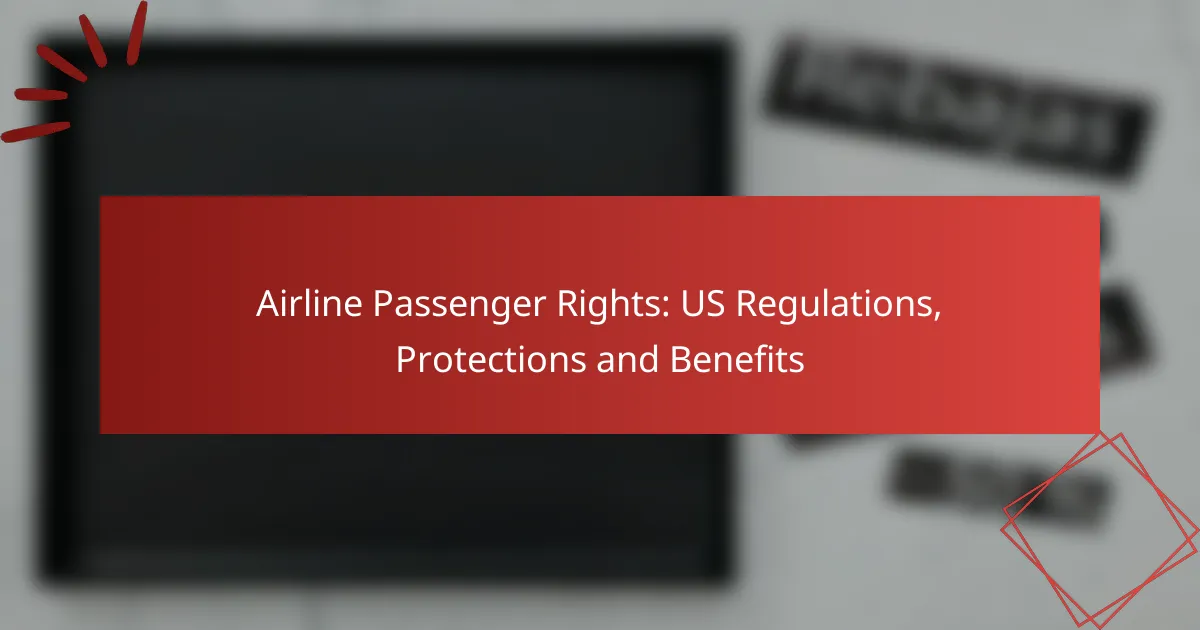In the US, airline passengers are afforded specific rights designed to protect them during travel disruptions such as cancellations, delays, and denied boarding. Familiarizing yourself with these regulations can empower you to seek fair treatment and compensation, ensuring a smoother travel experience. If you encounter any violations of your rights, prompt documentation and action are essential for resolution.
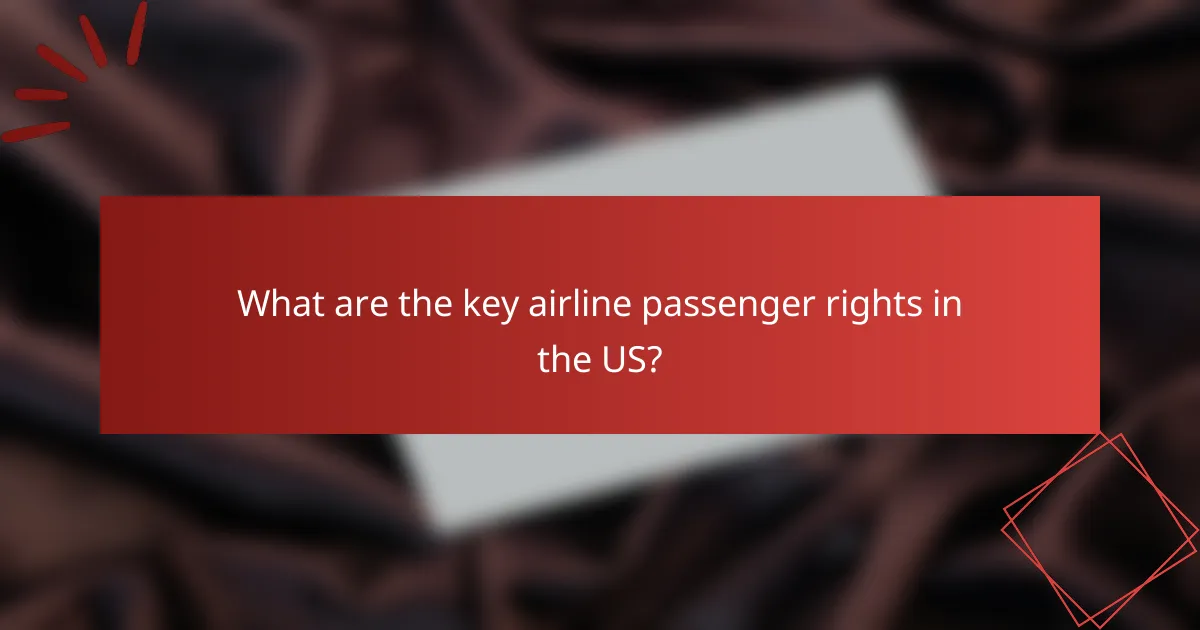
What are the key airline passenger rights in the US?
In the US, airline passengers have specific rights that protect them in various situations, including flight cancellations, denied boarding, and delays. Understanding these rights can help passengers navigate issues with airlines and ensure they receive appropriate compensation and assistance.
Right to compensation for flight cancellations
Passengers are entitled to compensation if their flight is canceled by the airline, especially if the cancellation is within the airline’s control. Compensation can vary but typically includes reimbursement for the ticket price and additional expenses incurred due to the cancellation.
Airlines must notify passengers of cancellations and offer rebooking options or refunds. If the cancellation is due to weather or other uncontrollable factors, compensation may not be required.
Right to compensation for denied boarding
If a passenger is denied boarding due to overbooking, they are entitled to compensation. The amount can depend on the length of the delay caused by being denied boarding, with compensation potentially reaching several hundred dollars.
Airlines must provide written notice of the passenger’s rights and the compensation process. Passengers should be aware of their rights and ask for compensation if they face denied boarding.
Right to refunds for delayed flights
Passengers have the right to a refund if their flight is significantly delayed, especially if the delay exceeds a certain threshold. Airlines typically define significant delays as those lasting several hours or more.
In addition to refunds, airlines may offer travel vouchers or rebooking options. Passengers should keep all receipts and documentation to support their claims for refunds.
Right to assistance during long delays
During long delays, airlines are required to provide assistance, which may include meals, accommodations, and communication options. The level of assistance often depends on the length of the delay and the airline’s policies.
Passengers should inquire about available assistance and keep records of any expenses incurred due to delays. Knowing the airline’s policies can help ensure that passengers receive the support they need.
Right to access to information
Passengers have the right to receive timely and accurate information regarding their flights, including delays, cancellations, and gate changes. Airlines are required to communicate this information through various channels, such as announcements and mobile apps.
Staying informed can help passengers make necessary adjustments to their travel plans. It’s advisable to check the airline’s website or app regularly for updates, especially during travel disruptions.
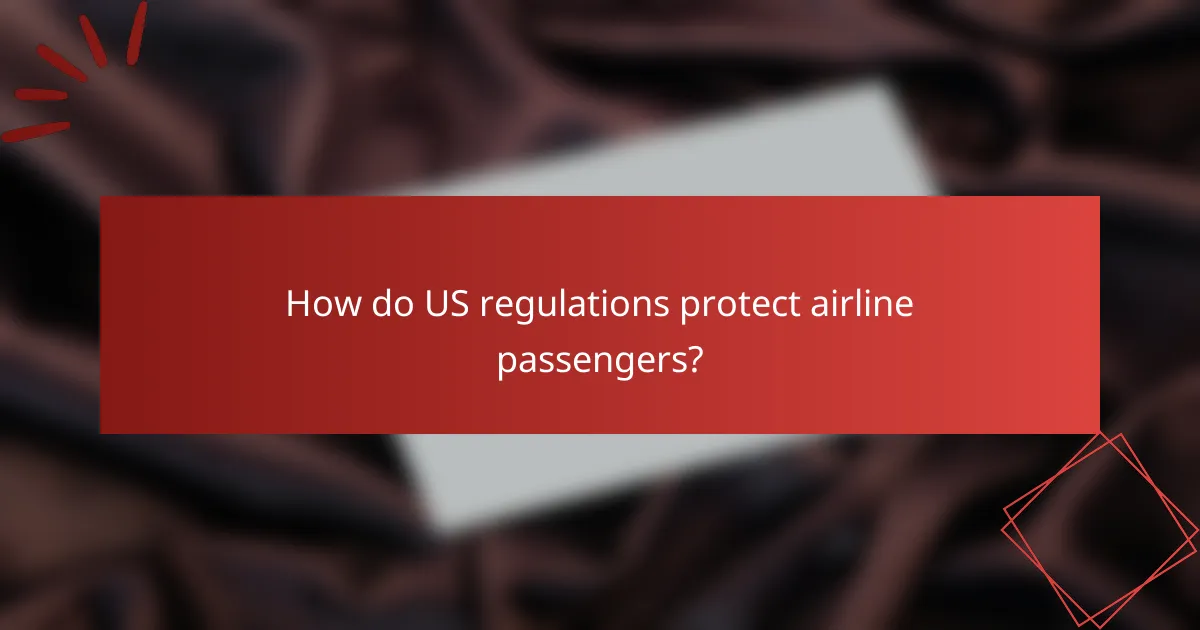
How do US regulations protect airline passengers?
US regulations provide essential protections for airline passengers, ensuring fair treatment and compensation in various situations. These regulations cover issues such as flight delays, cancellations, and baggage handling, helping to create a more equitable travel experience.
Department of Transportation regulations
The Department of Transportation (DOT) enforces regulations that safeguard airline passengers’ rights. Key rules include requirements for airlines to provide timely information about delays and cancellations, as well as compensation for passengers affected by overbooking. For instance, if a flight is significantly delayed or canceled, airlines must offer refunds or rebooking options.
Additionally, the DOT mandates that airlines disclose their policies regarding fees, including those for checked baggage and ticket changes. This transparency helps passengers make informed choices when booking flights.
Airline policies and procedures
Airlines have their own policies and procedures that complement federal regulations. These policies often outline specific compensation for delays, cancellations, and lost baggage. For example, many airlines offer meal vouchers or hotel accommodations for passengers stranded overnight due to flight disruptions.
It’s crucial for passengers to familiarize themselves with the specific policies of the airline they are flying with, as these can vary widely. Checking the airline’s website or contacting customer service can provide clarity on what to expect in case of travel disruptions.
Consumer protection laws
Consumer protection laws at both federal and state levels further enhance passenger rights. These laws prohibit unfair or deceptive practices, ensuring that airlines cannot mislead customers about their services or fees. For example, if an airline advertises a fare, it must honor that price without hidden fees that significantly increase the total cost.
Passengers can also file complaints with the DOT if they believe their rights have been violated. This process helps enforce regulations and encourages airlines to adhere to fair practices, ultimately benefiting all travelers.

What should you do if your rights are violated?
If your rights as an airline passenger are violated, it’s crucial to take immediate action to address the issue. Start by documenting the incident and then follow the appropriate channels to file complaints and seek resolution.
File a complaint with the airline
The first step is to file a complaint directly with the airline involved. Most airlines have a customer service department dedicated to handling such issues. Provide detailed information about your experience, including flight details, dates, and any relevant documentation.
Be clear about the specific violation of your rights and what resolution you are seeking, whether it’s a refund, compensation, or another form of redress. Airlines typically respond within a few weeks, so keep track of your correspondence.
Contact the Department of Transportation
If the airline does not resolve your complaint satisfactorily, you can escalate the matter by contacting the U.S. Department of Transportation (DOT). The DOT oversees airline regulations and can investigate complaints regarding violations of passenger rights.
You can file a complaint online through the DOT’s Aviation Consumer Protection website. Include all relevant details and documentation to support your case, as this will help expedite the review process.
Seek legal advice
If you believe your situation warrants further action, consider seeking legal advice. An attorney specializing in aviation or consumer rights can provide guidance on your options, including potential lawsuits for significant violations.
Before proceeding, evaluate the costs versus potential benefits. Legal action can be time-consuming and expensive, so ensure you have a strong case and understand the likelihood of success.

How can you maximize your benefits as an airline passenger?
To maximize your benefits as an airline passenger, it’s essential to understand your rights and take proactive steps before and during your travel. Familiarizing yourself with regulations, keeping thorough documentation, and considering travel insurance can significantly enhance your experience and protections.
Know your rights before flying
Understanding your rights as an airline passenger is crucial for ensuring a smooth travel experience. In the U.S., the Department of Transportation (DOT) outlines several key protections, including compensation for flight delays, cancellations, and denied boarding due to overbooking. Familiarize yourself with these regulations to advocate effectively for yourself if issues arise.
For instance, if your flight is delayed or canceled, airlines are required to provide accommodations and assistance, depending on the circumstances. Knowing these rights can help you navigate unexpected situations more confidently.
Keep documentation of your travel
Maintaining thorough documentation of your travel is vital for asserting your rights. Keep copies of your tickets, boarding passes, and any communication with the airline regarding your flight. This documentation can be essential if you need to file a complaint or claim compensation.
Additionally, take note of any delays or cancellations, including timestamps and reasons provided by the airline. This information can support your case if you seek reimbursement or other remedies later.
Use travel insurance for added protection
Travel insurance can offer additional protection and peace of mind when flying. Policies often cover trip cancellations, lost luggage, and medical emergencies, which can save you money and stress. Consider purchasing a policy that includes coverage for airline-related issues, especially if you are traveling during peak seasons or to remote destinations.
When selecting travel insurance, compare different plans and read the fine print to understand what is covered. Some policies may have specific exclusions or limitations, so ensure that the coverage aligns with your travel needs.
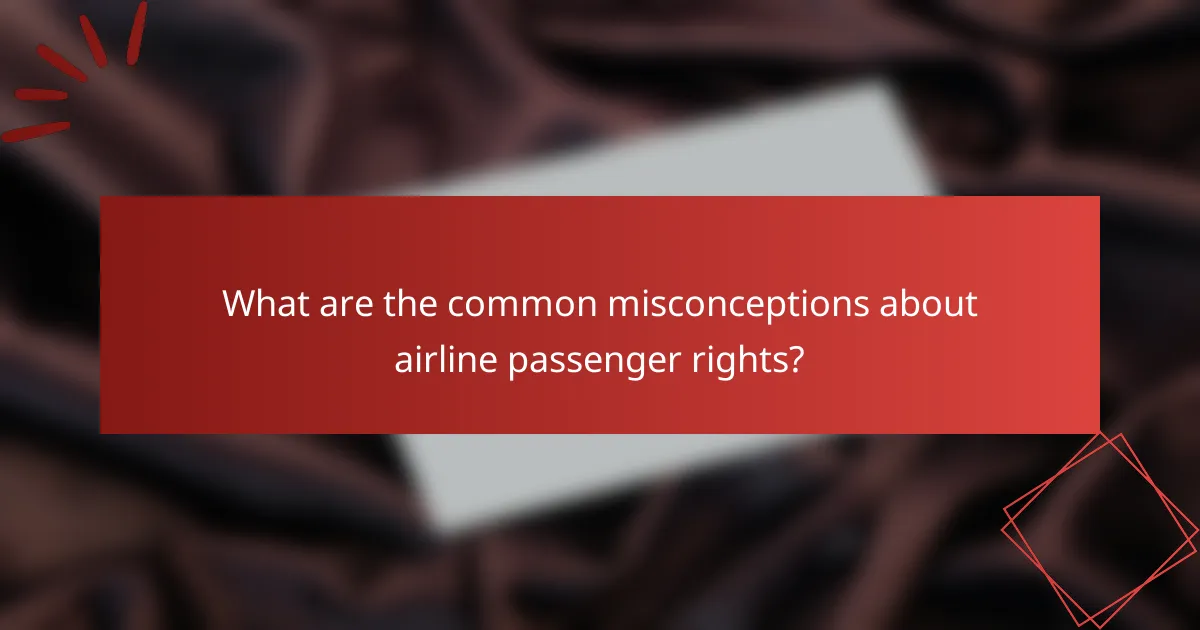
What are the common misconceptions about airline passenger rights?
Many travelers hold misconceptions about their rights as airline passengers, which can lead to confusion and frustration. Understanding these misconceptions is crucial for effectively navigating air travel and ensuring proper treatment from airlines.
Misunderstanding compensation limits
One common misconception is that compensation limits for flight delays and cancellations are uniform across all airlines. In reality, compensation can vary significantly based on factors such as the airline’s policies, the cause of the disruption, and the flight’s distance. For instance, under U.S. regulations, passengers may receive up to $1,350 for denied boarding due to overbooking, but this amount can differ for international flights.
Travelers should familiarize themselves with the specific compensation policies of the airline they are flying with, as these can influence the amount they may be entitled to receive. Checking the airline’s website or contacting customer service can provide clarity on compensation limits.
Assuming all airlines have the same policies
Another misconception is that all airlines operate under the same set of rules regarding passenger rights. However, each airline has its own policies regarding cancellations, delays, and compensation. For example, low-cost carriers may have more restrictive policies compared to major airlines.
Passengers should review the terms and conditions of their chosen airline before traveling. Understanding the specific policies can help travelers make informed decisions and set realistic expectations about their rights during their journey.
Believing that rights apply only to domestic flights
Many passengers mistakenly believe that their rights only apply to domestic flights within the U.S. In fact, international flights are also subject to specific regulations, although these may differ from domestic rules. For example, the Montreal Convention governs compensation for international flights, which can include provisions for lost luggage and delays.
Travelers should be aware of the regulations that apply to both domestic and international flights. Researching the relevant laws and airline policies can help ensure that passengers are fully informed about their rights, regardless of their travel destination.
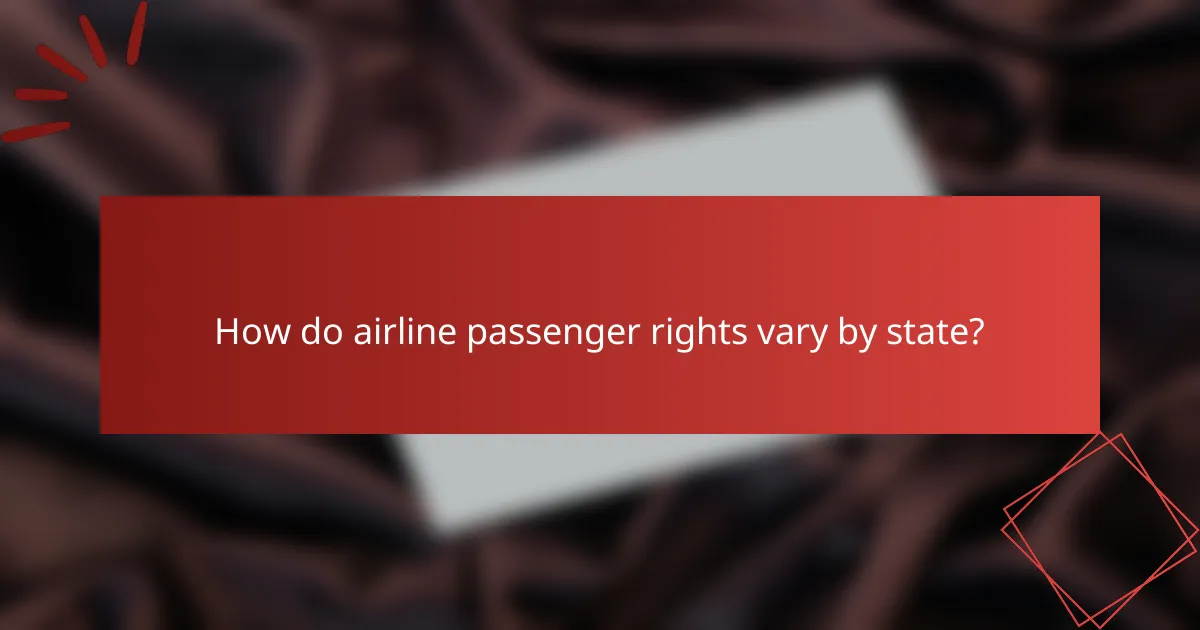
How do airline passenger rights vary by state?
Airline passenger rights can differ significantly by state, as some states have enacted their own consumer protection laws that enhance federal regulations. These laws may address issues such as flight cancellations, delays, and compensation, providing additional rights beyond what federal law mandates.
State-specific consumer protection laws
Many states have established consumer protection laws that specifically apply to airline passengers. For instance, California has regulations requiring airlines to provide refunds for canceled flights, even if the cancellation is due to weather. Similarly, New York mandates that airlines must compensate passengers for delays exceeding a certain duration.
These state laws can vary widely, so it’s crucial for passengers to understand their rights based on their location. Some states may offer stronger protections, while others may rely more heavily on federal guidelines. Always check local regulations before traveling to ensure you are aware of your rights.
